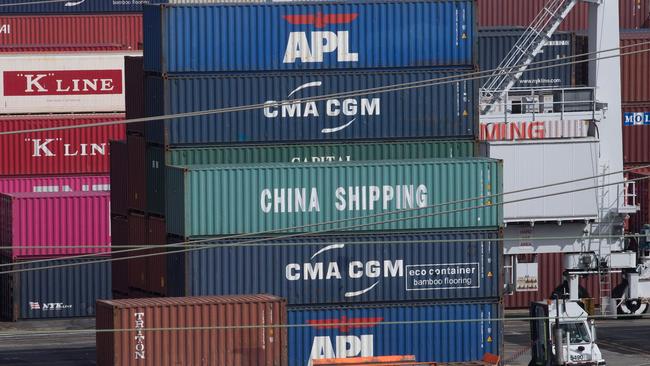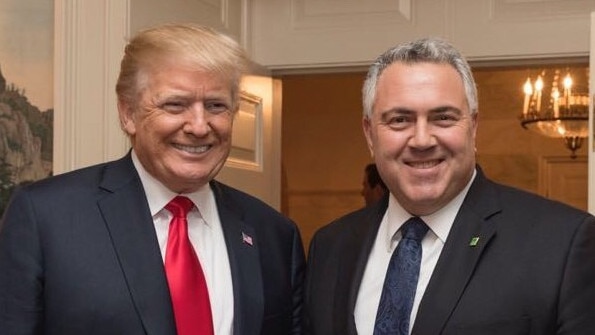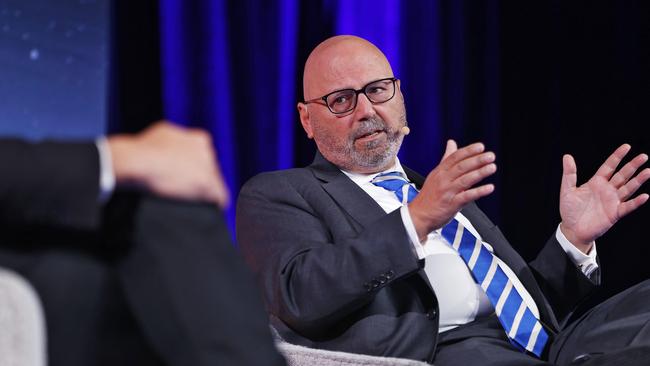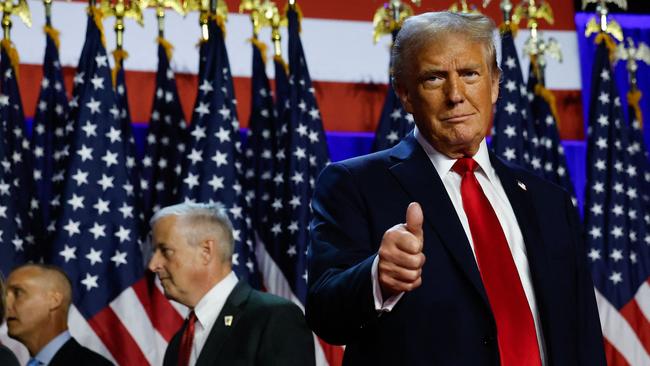Business leaders on edge over Trump trade war risk
A former US ambassador says Donald Trump is serious about higher tariffs on China but not all business and political leaders believe it will spark a trade war and reignite inflationary pressure.

Business and political leaders are split on whether Donald Trump will spark a trade war and impose heavy tariffs on China amid concern an ‘‘America first’’ policy may reignite fresh inflationary pressures in the global economy.
As part of Mr Trump’s Make America Great Again pledge, he has vowed to impose 60 per cent tariffs on Chinese-made goods, and a 10 per cent across-the-board tariff on all US imports.
Prominent Australian business leaders, including Wesfarmers chair Michael Chaney, have warned that Mr Trump’s proposal risks sparking a fierce trade war with China, stoking inflation and slowing the Federal Reserve’s mooted rate-easing cycle.
Bendigo Bank chief executive Richard Fennell said he was cautious on whether election pledges would flow through to government policy.
The 60 per cent tariff on China “is unlikely to eventuate but there’s no doubt some of his announced policies will be inflationary certainly for the US economy,” he told the Australian. “How that plays out globally I think remains to be seen”.
However, Australia’s former US ambassador Joe Hockey said it was a “long bow” to suggest that Mr Trump’s proposed tariffs would fuel inflation.

“The inflationary impact in Australia is debatable, because you might be able to argue that there’ll be changes in the US/Australian dollar that would either mitigate or exacerbate the impact of US tariffs,” he said on Tuesday. “So I think it’s drawing a long bow to immediately link increased tariffs in the United States to increased inflation.
“It’s too long a bow from an economic perspective because there are so many other factors that come into play.”
Another former ambassador to the US, Arthur Sinodonis, said Mr Trump believed in tariffs and thought it would be a “free lunch” for the US, a view which would have implications for Australia. “We need to take him seriously when he talks about tariffs,” he told the UBS Australasia conference. “I think he is serious about a higher tariff on China, which has potential flow-on effects for us.”
Mr Sinodinos said Mr Trump had “got religion on tariffs”.
“He believes in them. He thinks it is a free lunch (for the US). He thinks it is at the expense of foreigners. From his perspective, it is the ideal protectionist weapon if he has the congress with him as well.”
Mr Sinodinos said the next two years would be critical as Trump would have more capacity to get legislation through the US congress ahead of congressional elections in November 2026.
Aitken Advisors founder James Aitken said while predicting the financial impact of a second Trump administration was difficult, if US economic output was sustained, markets would remain buoyant for longer than expected.

“In terms of spillovers on markets ... if they can contrive to floor nominal GDP growth at 5 per cent and in so doing stabilise the budget deficit, which is a ratio, then maybe all of this (market rally) can hold together for a lot longer than we understand today,” Mr Aitken told the UBS conference.
“The preconditions that drive asset prices today might be continued for a lot longer than we understand today, which is not a bad thing.
“Any country … but particularly the United States where nominal GDP is 5 per cent – and that’s not the ceiling any more, that’s the floor … That country, the United States, is going to be generating more than adequate cashflow to service all its debts.”
Mr Aitken, who is based in London, said it was likely that well run companies would tend to do well against that macroeconomic backdrop.
“If I’m trying to understand what’s happening in risk assets in general, I go back to what’s happening to nominal GDP, and it’s still in pretty good shape.”
Mr Hockey said the tariffs were more likely to be targeted and the AUKUS agreement gave Australia an advantage compared with other countries.
“It’s arguable that if the US were to apply 10 per cent tariffs across the board immediately, it would have such a massive impact on the US economy that the shock impact would be even greater than the economic impact.
“So if it’s economy wide, he would probably need congressional support, and I wouldn’t guarantee that he’d get full congressional support. So it’s more likely the tariffs will be targeted, and the president will use various powers like national security power, in which case, Australia has something now that it didn’t have when we were dealing with tariffs on steel and aluminium, and that’s AUKUS agreement. It gives us extra debating points.”
Mr Sinodonis said he thought the Chinese could seek to head off a trade war with a conference with the Trump Administration early in his term.

He said there was a danger for Australia that this conference could see other issues put on the table by China, including the future of Taiwan, which could have adverse effects on Australia.
He said a Trump presidency would be a boost for the oil and gas industry, with his policies of “drill baby drill”. He said Trump would reduce controls on the energy sector, which would be very positive for the sector in the US.
He said companies would need to pay more attention to changing geopolitical issues, with some now dividing themselves into three units: the US, China and the rest of the world.
He said the term “ESG” would now see a greater focus on the letter “G”, which should stand for “geopolitics”.
Australian tech companies looking to launch in the US were “pushing against a more open door” under Donald Trump than Joe Biden and should not be concerned about the president-elect’s proposed sweeping tariffs, Mr Hockey said.
He said there remained a “lot of goodwill towards Australia”, which “extends right down the pipeline”, despite Australia’s current US Ambassador Kevin Rudd branding Mr Trump the “most destructive president in history” in now deleted posts on X.
He said Elon Musk – one of Mr Trump’s biggest backers, who is set to take on a new role as head of the new Department of Government Efficiency – would make a “positive difference” in regard to opportunities for the tech sector.
“The one thing about our relationship with the US that everyone recognises is that we are lifters, we’re not leaners,” Mr Hockey told The Australian.
“We are people that carry our weight and are prepared to contribute more where appropriate. Everyone walks into the White House and asks for something. Australia is one of the few countries that walks into the White House and says, ‘How can we help?’
“There’s a lot of goodwill towards Australia and Australian innovation. And even though everyone’s expecting a fairly significant turnover in leadership of various agencies, that goodwill extends right down the pipeline.”
Mr Trump has vowed to axe red tape, particularly on artificial intelligence, which he said stifled innovation, with Mr Biden’s executive order on ensuring safe use of AI imposing “radical left wing ideas”.
“There’ll be a natural speed up in FDA (Food and Drug Administration) applications and a determination to remove unnecessary regulation,” Mr Hockey said.
Additional reporting by Joyce Moullakis



To join the conversation, please log in. Don't have an account? Register
Join the conversation, you are commenting as Logout